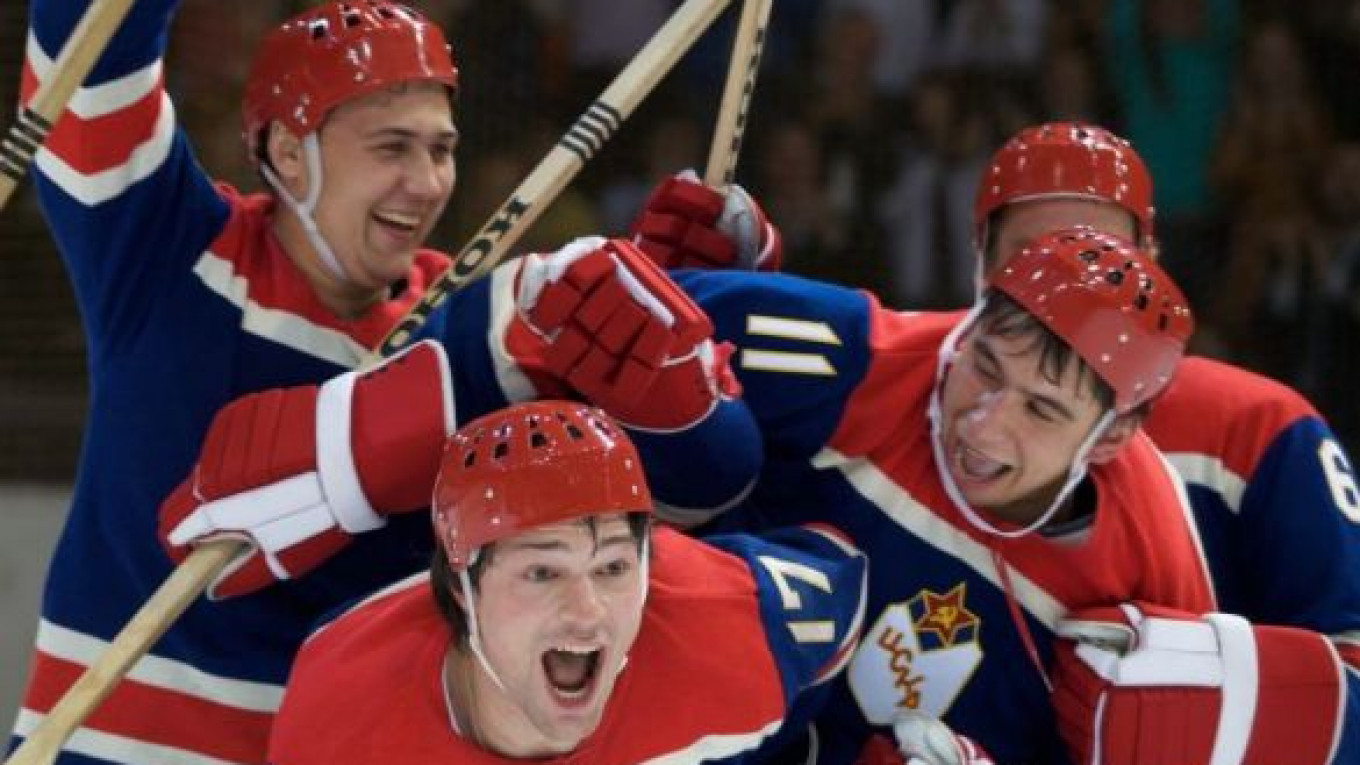While many recent attempts by Russian filmmakers to create a patriotic blockbuster have largely failed, a new biopic dedicated to Soviet hockey master Valery Kharlamov, was a big hit with both critics and audiences alike.
"Legend #17," which was released early last week, managed to generate more than 35 million rubles ($1.1 million) over the course of a single day, according to film producers. This is considered the best result for a Russian-made film in recent years.
In one Moscow city film hall, the awestruck audience burst into loud applause as the credits began to roll.
The film, shot by director Nikolai Lebedev, tells the story of Kharlamov, an enigmatic young hockey forward, who is transformed into a beloved sports celebrity in the Soviet Union after scoring the winning goal against Canada in 1972's Super Series — a dream of many Soviet hockey players before him.
"While I was collecting the material, I fell in love with our main character. He was a man with an unbelievable amount of appeal, very lively and full of energy," film director Lebedev told Rossiiskaya Gazeta.
Kharlamov is played by the young, inspirational actor Danila Kozlovsky, who strongly resembles the player. Like most of the other actors, he was specially trained to play hockey for "Legend #17," by Canadian stunt master Jodi Stecyk, who worked on films such as Interception and Resident Evil: Retribution.
While focusing on the life of the half-Spanish Kharlamov, the film concentrates heavily on his twisted relationship with his trainer, Anatoly Tarasov, who turned the Soviet hockey team into what became known in the West as the Red Machine.
Tarasov, played by leading Rusian actor Oleg Menshikov, is depicted as a strong, authoritarian guru who puts intense pressure on Kharlamov, first throwing him into a provincial team and then leaving sitting for days on the back bench.
"Students usually hate their teacher, some of them even betray them," Tarasov says in one of the scenes, while speaking to his team. But the film also shows that Tarasov's cruelty is mixed with complete devotion to all his players, including Kharlamov.
Tarasov's style of training is well captured in the film, said renowned Soviet hockey player Vladislav Tretyak, who also coached US players in the 1990s. "I suffered twice as much as Valery," Tretyak said half-jokingly during the film's presentation.
Tarasov's daughter Tatyana Tarasova, who is herself a well-known ice skater, said the film had "captured" her father well.
The strength and flamboyancy of Tarasov's character is also shown, such as the famous moment when he defied Communist party officials, who ask him to lose a game to Spartak, the favorite team of Soviet leader Leonid Brezhnev.
Tarasov refused to do so, ordering his players to leave the game.
"Does Leonid Ilyich set his own rules in hockey?", he asked sarcastically upon departure, referring to Brezhnev by his name and patronymic.
The film shows that Tarasov is relieved from his post as a team trainer over this incident, and is left at home while the team goes to Canada with another coach.
In reality, this conflict with Brezhnev took place in 1969, while Tarasov was relieved from his duties in 1972 on the eve of Super Serials with Canada.
Stepan Chaushyan, a well-known critic from the newspaper Argumenty i Fakty, recently praised the film in an article, saying that it turned out to be "great, real and thrilling."
The film ends with the dramatic Soviet victory in Canada, omitting Kharlamov's later tragic death in a 1981 car accident.
The Soviet national hockey team was able to win two games out of four in Canada, marking a world triumph for Kharlamov, despite tough pressure from Canadian players who perpetually tried to knock him down.
As both Kharlamov and Tarasov remain heroes for many in Russia, the film has been well-received, even drawing commentary from Russian President Vladimir Putin.
Putin nostalgically recalled watching the original games featuring Kharlamov and his fellow hockey players.
"It is hard to make such films about sports. It has turned very emotional," he told reporters.
Contact the author at a.bratersky@imedia.ru
Related articles:
A Message from The Moscow Times:
Dear readers,
We are facing unprecedented challenges. Russia's Prosecutor General's Office has designated The Moscow Times as an "undesirable" organization, criminalizing our work and putting our staff at risk of prosecution. This follows our earlier unjust labeling as a "foreign agent."
These actions are direct attempts to silence independent journalism in Russia. The authorities claim our work "discredits the decisions of the Russian leadership." We see things differently: we strive to provide accurate, unbiased reporting on Russia.
We, the journalists of The Moscow Times, refuse to be silenced. But to continue our work, we need your help.
Your support, no matter how small, makes a world of difference. If you can, please support us monthly starting from just $2. It's quick to set up, and every contribution makes a significant impact.
By supporting The Moscow Times, you're defending open, independent journalism in the face of repression. Thank you for standing with us.
Remind me later.






